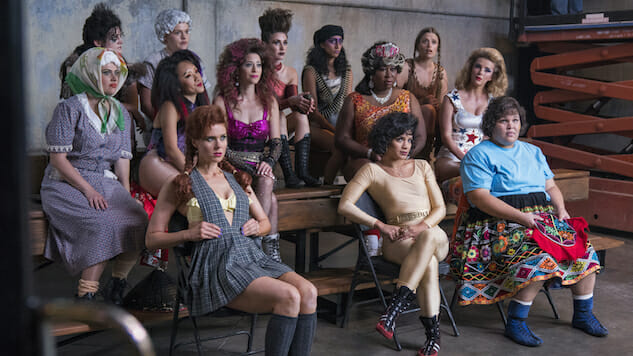GLOW Season Two Pays Glorious Homage to the ’80s, but Its Politics Are Tailor-Made for Now
Photo: Erica Parise/Netflix
I can’t tell you how happy I am when a TV series’ second season exceeds its first. It puts a little spring in my remote. GLOW debuted to relatively little fanfare last summer before word quickly spread that a fictionalized take on how the Gorgeous Ladies of Wrestling came to be was much more thought-provoking and nuanced than its premise would lead you to believe. It sounds like it should be some tacky, laugh-tracked sitcom. But it’s decidedly not.
Even though it takes place in the 1980s, GLOW feels very current. Strip away the decade’s big hair, loud clothes and bombastic music and the themes the dramedy visits in its stellar 10-episode second season mirror many of the struggles women face today—sexual harassment, balancing motherhood with a career, the fight to be seen as an equal partner in the workplace. It does all this while featuring one of the most diverse casts of women this side of Orange is the New Black.
But there I go becoming much too serious about a series that is so much fun. Now that a cable channel has picked up their show, the gang returns to film a full season. Sam (Marc Maron) remains a curmudgeon with a heart of—well, if not gold, at least gold-plate. Ruth (Alison Brie) is full of ideas, good ones: Much to Sam’s chagrin, she’s got a director’s instinct. Debbie (Betty Gilpin) savvily leverages the popularity of her wrestling alter-ego, Liberty Belle, for a producer’s credit. Carmen (Britney Young) is more secure in her training. And sweet, daft Bash (Chris Lowell) is still trying to figure out how to forge a career with no discernible skills. Cherry (Sydelle Noel) is off on her new TV show and Sam has unceremoniously brought in Yolanda (Shakira Barrera) to replace her as Junkchain. Ruth’s first order of business is to film a title sequence with the help of new camera man. As usual, her goals are lofty: “Do you think we really captured the nexus of girl-on-girl violence and consumer culture in America?” Ruth asks him.
Although the series flirts with a possible courtship between Ruth and the cameraman with the nice smile, the series is refreshingly romance-free. These women have bigger things to worry about than their love lives. The show’s central relationship is the fractured friendship between Ruth and Debbie. Ruth feels guilty about sleeping with Debbie’s husband, but she also wants to move on. Debbie isn’t so quick to forgive her. Their long simmering rage comes to a head in the season’s seventh episode and it is glorious.
-

-

-

-

-

-

-

-

-

-

-

-

-

-

-

-

-

-

-

-

-

-

-

-

-

-

-

-

-

-

-

-

-

-

-

-

-

-

-

-








































